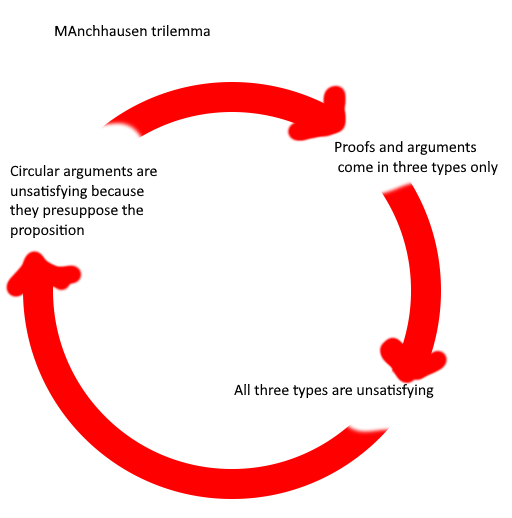Are beliefs needed? NopeThe Manchhausen "trilemma" states that circular arguments are unsatisfying:
The circular argument, in which the proof of some proposition presupposes the truth of that very proposition...
Therefore... before justifyingis among the three equally unsatisfying options.
The Manchhausen "trilemma" presupposes:
- the three proposed "argument types" are exact, exhaustive, exclusive, valid
- all proofs are one of the three proposed types
- all three types are equally unsatisfying
as proof that all proofs are unsatisfying.
Maybe Karl Popper was pranking philosophy students?
It makes sense that he concludes:
"work with knowledge by way of conjecture and criticism." - Karl Popper
Per "Suppose that two persons, X and Y, are asked the same question "why do you believe what you believe?", and for each justification they offer, they are subsequently asked the question "why?"."
Where I am "Y", my response is...
"I have no "beliefs". I have in my head, no thoughts or hearing arguments fornotions or againstconcepts or conclusions that I in any way characterize as a belief"belief".
I have conclusions.
I have suspicions. ask
I have theories.
I have guesses.
I have suggestions.
"Are beliefs neededI have knowledge.
I have suspicions.
I have predictions.
I have estimates.
I have awarenesses. Recognitions. Understandings.
But nothing I need to apply the word "belief" to.
SOME would want to call my knowledge "justified true belief".
I would call it informed conclusion... knowledge.
Therefore, when asked "Why do you believe what you believe?"... my answer is "I have no beliefs".
If the question is "How do I know what I know?" or "Why do I think I know what I know?" that is an answerable question.
But really needs more context. More specifics.
I can seegive some examples, to elucidate.
FUNDAMENTAL FORCES... I do not believe in them. I expect the do not exist. I may be wrong. I expect they are emergent... a result of interactions at a sub-atomic scale that are not "forces". I may be wrong.
THE BIG BANG... I do not believe in such an event. I expect the universe is eternally old, infinitely vast, populated by an infinite number of planets and stars and galaxies, and galactic groups and galactic clusters and galactic superclusters... in a steady state situation. But again, I may be wrong.
THE AGE OF THE EARTH... I trust that the academics that have studied the evidence have a good enough set od data that reconciles enough to allow for just conclusion that the Earth is at least some billions of years old. I consider it fair to expect that they might be off by some margin of error due to some gaps in knowledge. Maybe a few percent. Not more, because the "gaps" in knowledge are not significant. My choice to trust the academic position to be pretty much correct may be misplaced. But I expect not and have zero reason to expect that is the case.
THE SHAPE OF THE EARTH... doesn't need discussing. dissidents aren't worth addressing.
One really truly does not have to hold a place in one's head for "beliefs", if one doesn't want to and has no justificationtime for needing them.
For "justification"... go with things such as:
- reproducability
- confirmability
- reviewability
- reconciliation
- coherence

